Page Summary
-
This guide explains how to integrate PubMatic ads into your iOS app using Google Mobile Ads SDK and AdMob Mediation, focusing on bidding integrations.
-
The PubMatic mediation adapter supports bidding and waterfall integrations across various ad formats including App open, Banner, Interstitial, Rewarded, Rewarded Interstitial, and Native ads.
-
Key requirements for integration include iOS deployment target 12.0+, the latest Google Mobile Ads SDK, and completing the AdMob mediation get started guide.
-
Setting up PubMatic demand in the AdMob UI involves configuring mediation settings for your ad unit and adding PubMatic OpenWrap SDK as a bidding ad source with the correct OpenWrap Ad Unit ID, Publisher ID, and Profile ID.
-
Privacy settings for GDPR and US state regulations must be implemented, ensuring PubMatic is added to the ad partners list in the AdMob UI and understanding that PubMatic automatically reads consent set by supported CMPs.
This guide shows you how to use Google Mobile Ads SDK to load and display ads from PubMatic using AdMob Mediation, covering bidding integrations. It covers how to add PubMatic OpenWrap SDK to an ad unit's mediation configuration, and how to integrate the PubMatic OpenWrap SDK and adapter into an iOS app.
Supported integrations and ad formats
The mediation adapter for PubMatic has the following capabilities:
| Integration | |
|---|---|
| Bidding | |
| Waterfall | |
| Formats | |
| App open | |
| Banner | |
| Interstitial | 1 |
| Rewarded | 1 |
| Rewarded Interstitial | |
| Native | 1 |
1 This format is in beta. Reach out to your account manager to request access.
Requirements
- iOS deployment target of 13.0 or higher
Latest Google Mobile Ads SDK.
Complete the mediation Get started guide.
Step 1: Set up configurations in PubMatic UI
Sign up or Log in to your PubMatic account and select the OpenWrap SDK card.
Add a new application
Navigate to the Apps tab and click the Add App button.
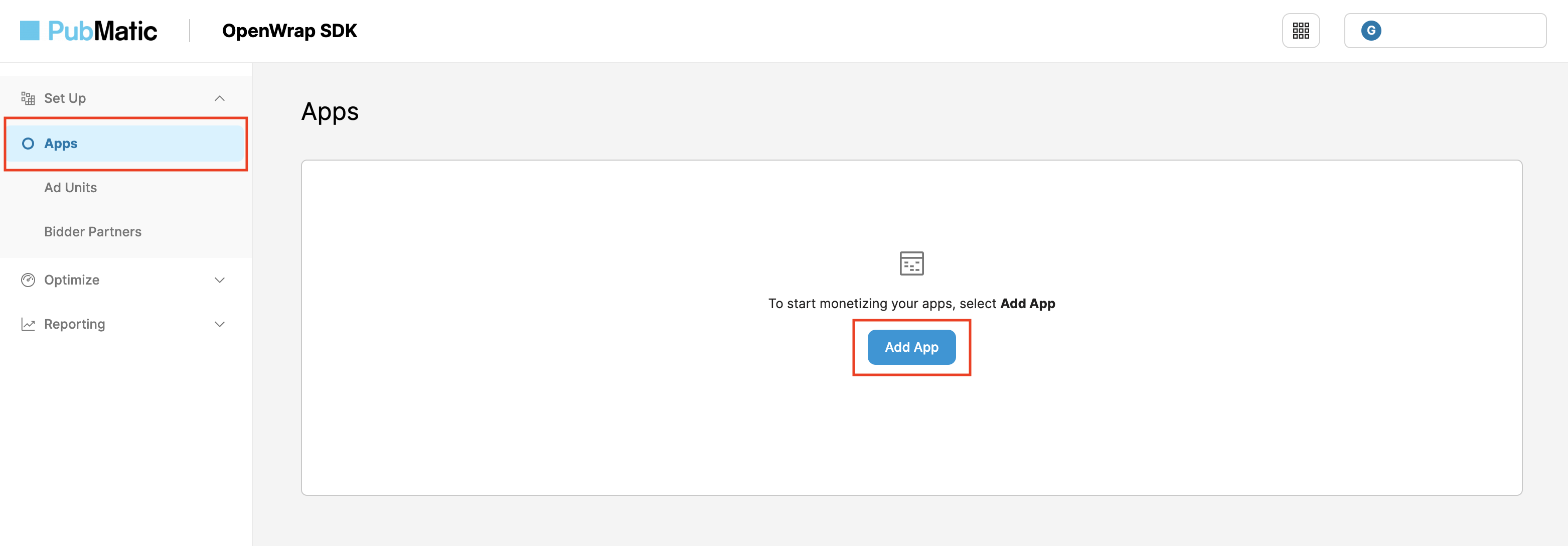
Select the Platform, as well as the App Store URL and App Name for your app.
Under Integration Path, select iOS (Objective-C / Swift) and select AdMob - SDK Bidding as the Sub-integration Path. Then, click the Add App button.
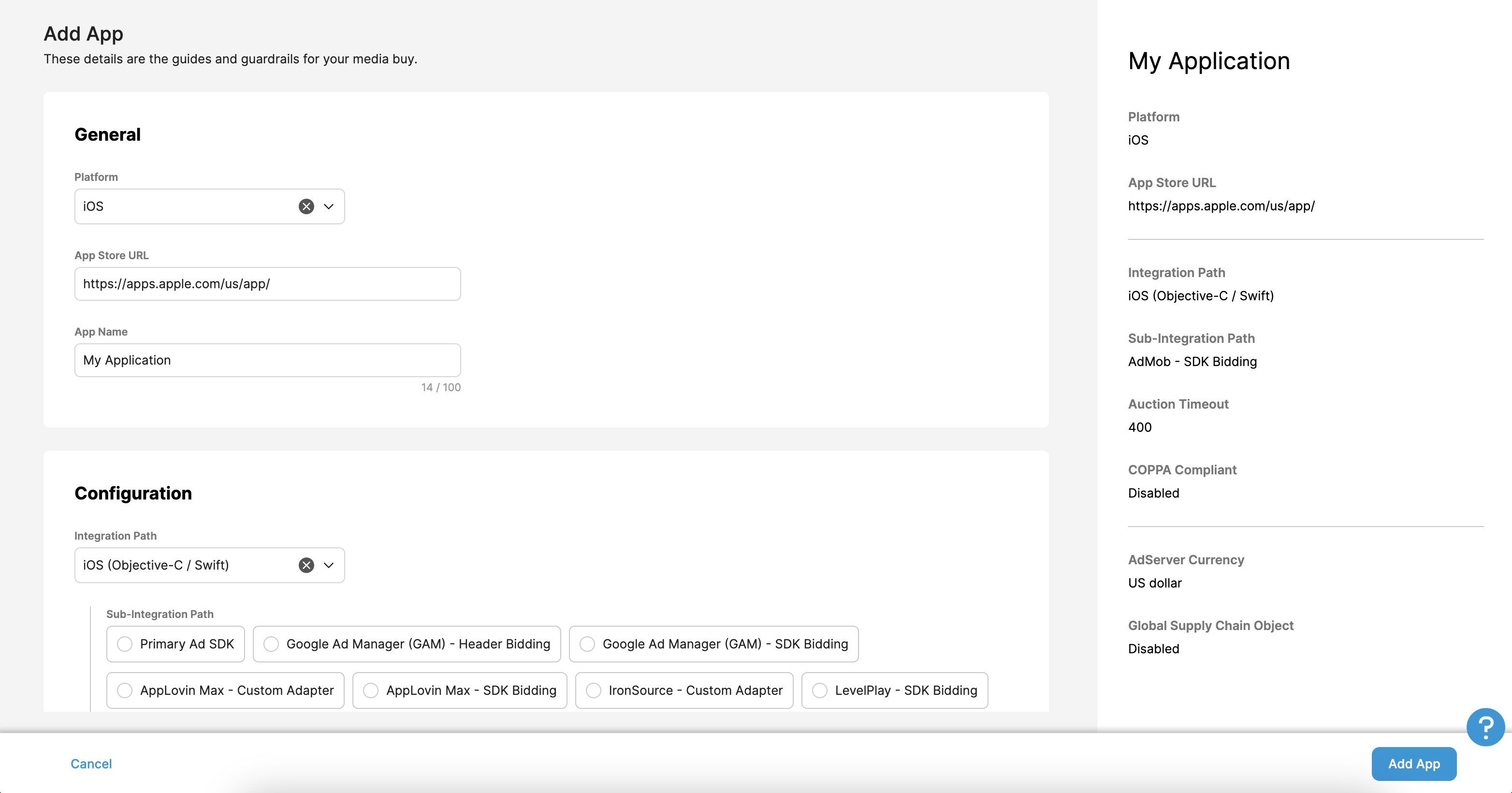
Update your app-ads.txt
Authorized Sellers for Apps app-ads.txt is an IAB Tech Lab initiative that helps ensure your
app ad inventory is only sold through channels you've identified as authorized. To prevent a
significant loss in ad revenue, you'll need to implement an app-ads.txt file.
If you haven't done so already,
set up an app-ads.txt file for your app.
Before your app is finalized, you will be presented the appropriate entries to
add to your app-ads.txt.
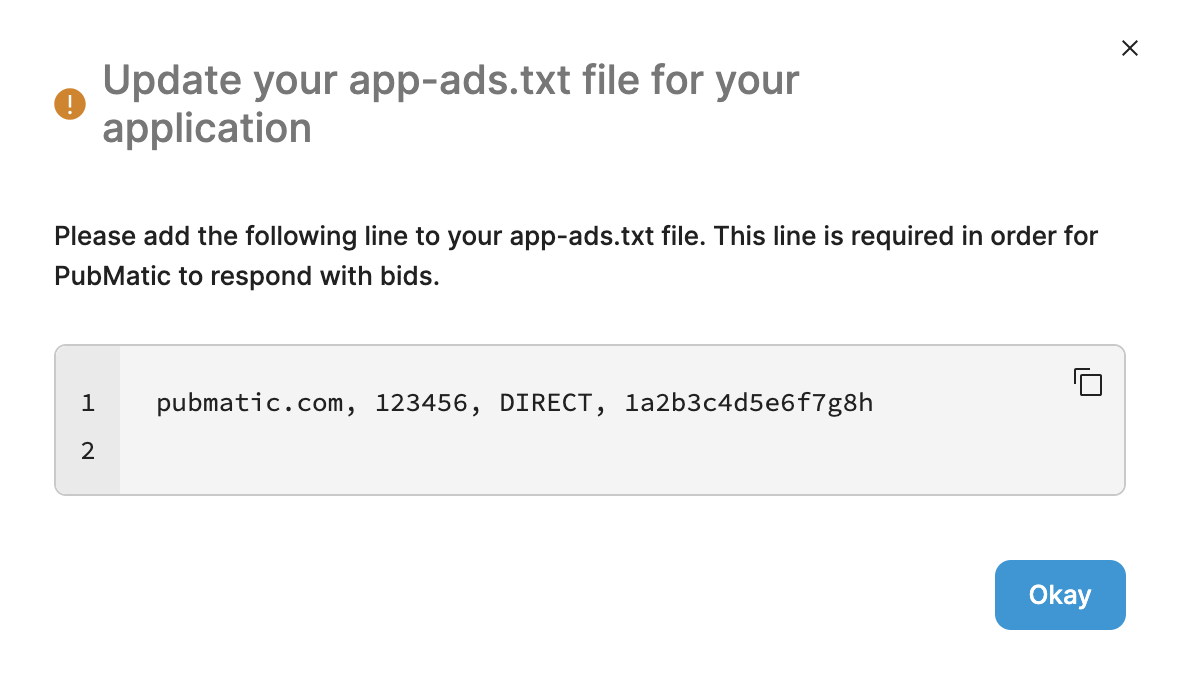
For additional information on how to implement app-ads.txt for PubMatic,
see How to Implement app-ads.txt.
Profile ID
Once your app is created, navigate to the Apps tab and take note of your newly created application's Profile ID.
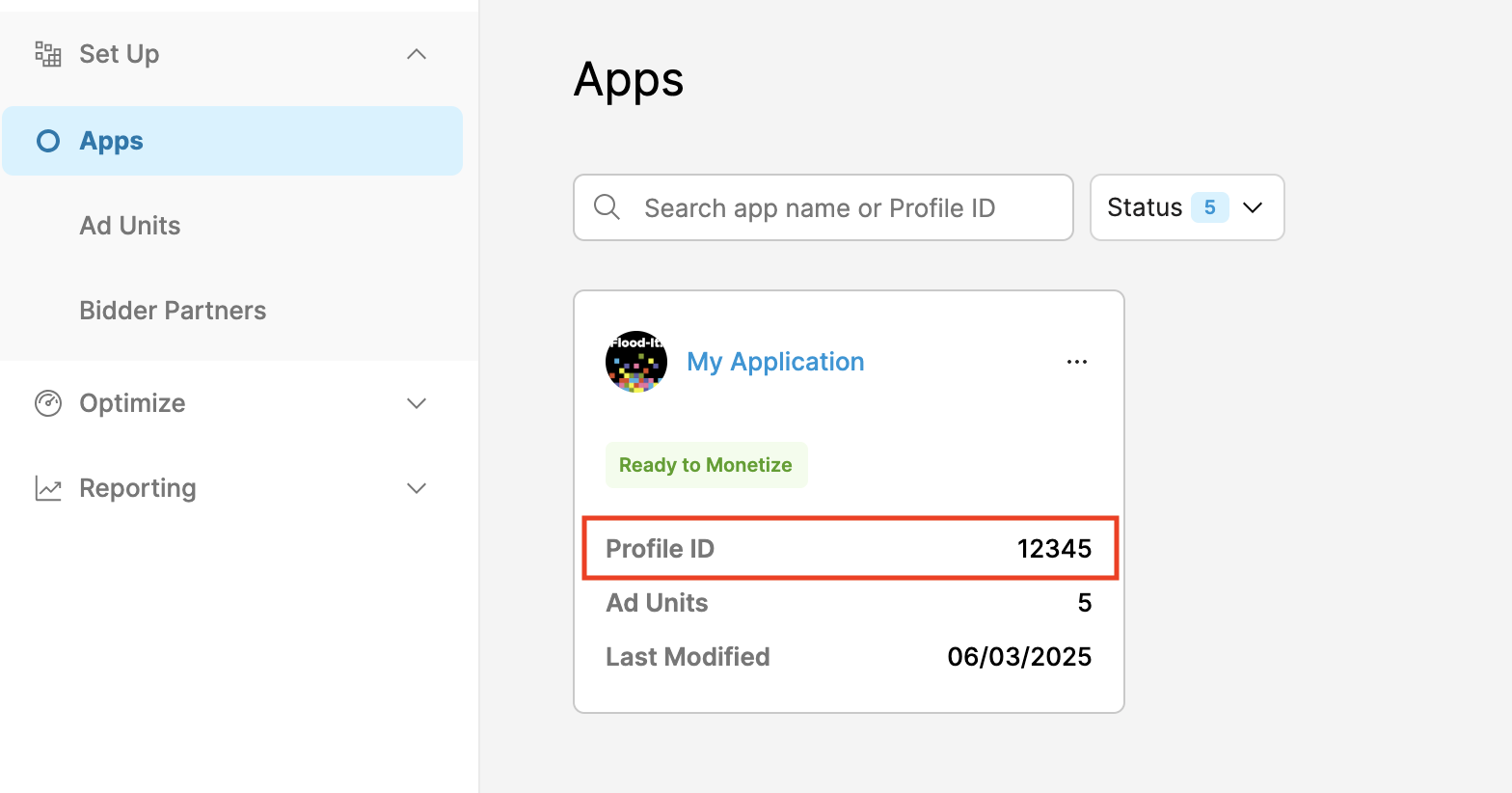
Create an ad unit
Under the Ad Units tab, select the app you created on the previous section and click the Create Ad Unit button.

Fill out the form with the details of your ad unit and click Save.
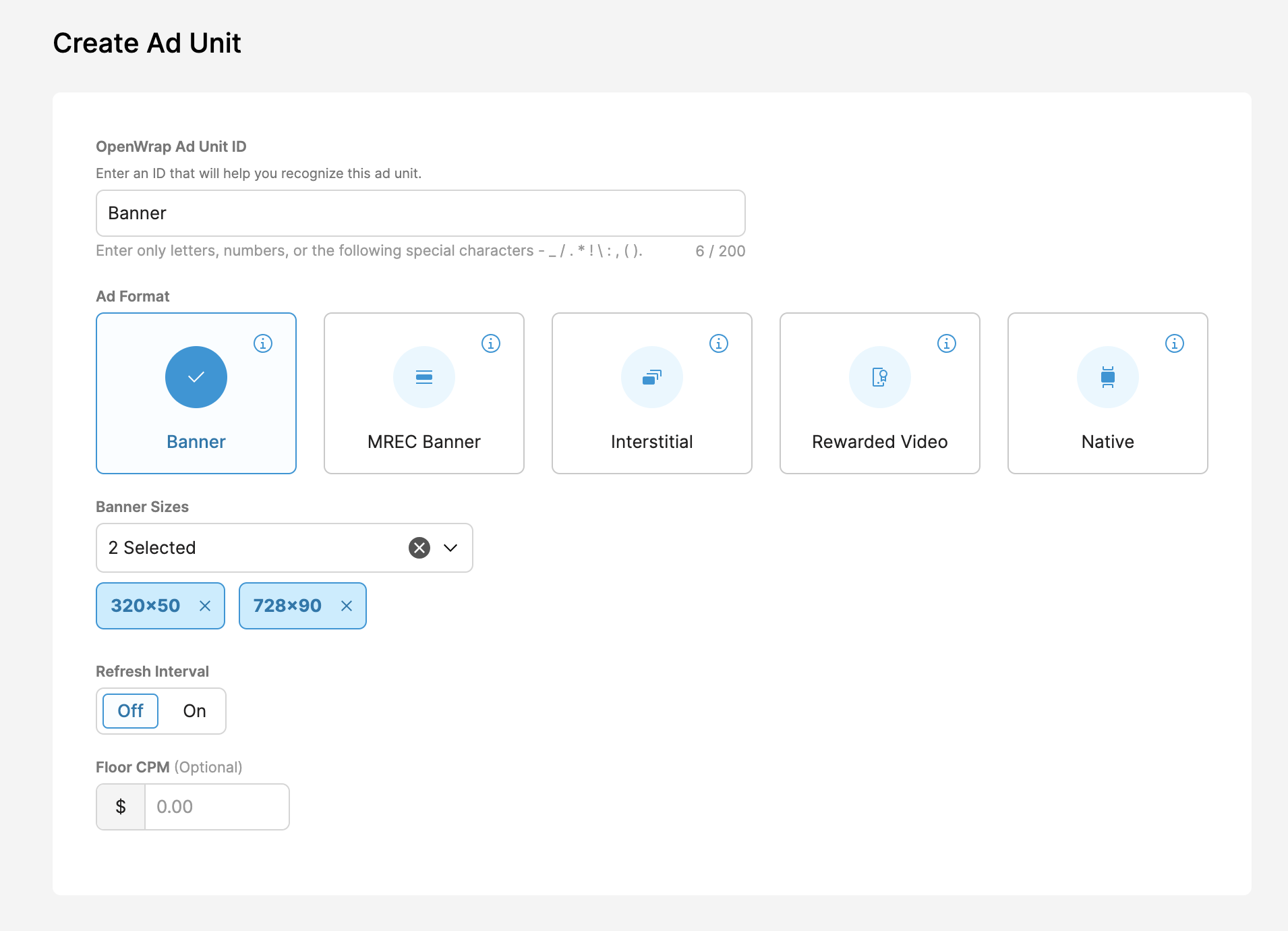
Take note of your newly created OpenWrap Ad Unit ID.

Obtain your Publisher ID
Navigate to the Analytics Dashboard. Hover over the profile icon and take note of your ID.

Step 2: Set up PubMatic demand in AdMob UI
Configure mediation settings for your ad unit
You need to add PubMatic OpenWrap SDK to the mediation configuration for your ad unit.
First, sign in to your AdMob account. Next, navigate to the Mediation tab. If you have an existing mediation group you'd like to modify, click the name of that mediation group to edit it, and skip ahead to Add PubMatic OpenWrap SDK as an ad source.
To create a new mediation group, select Create Mediation Group.
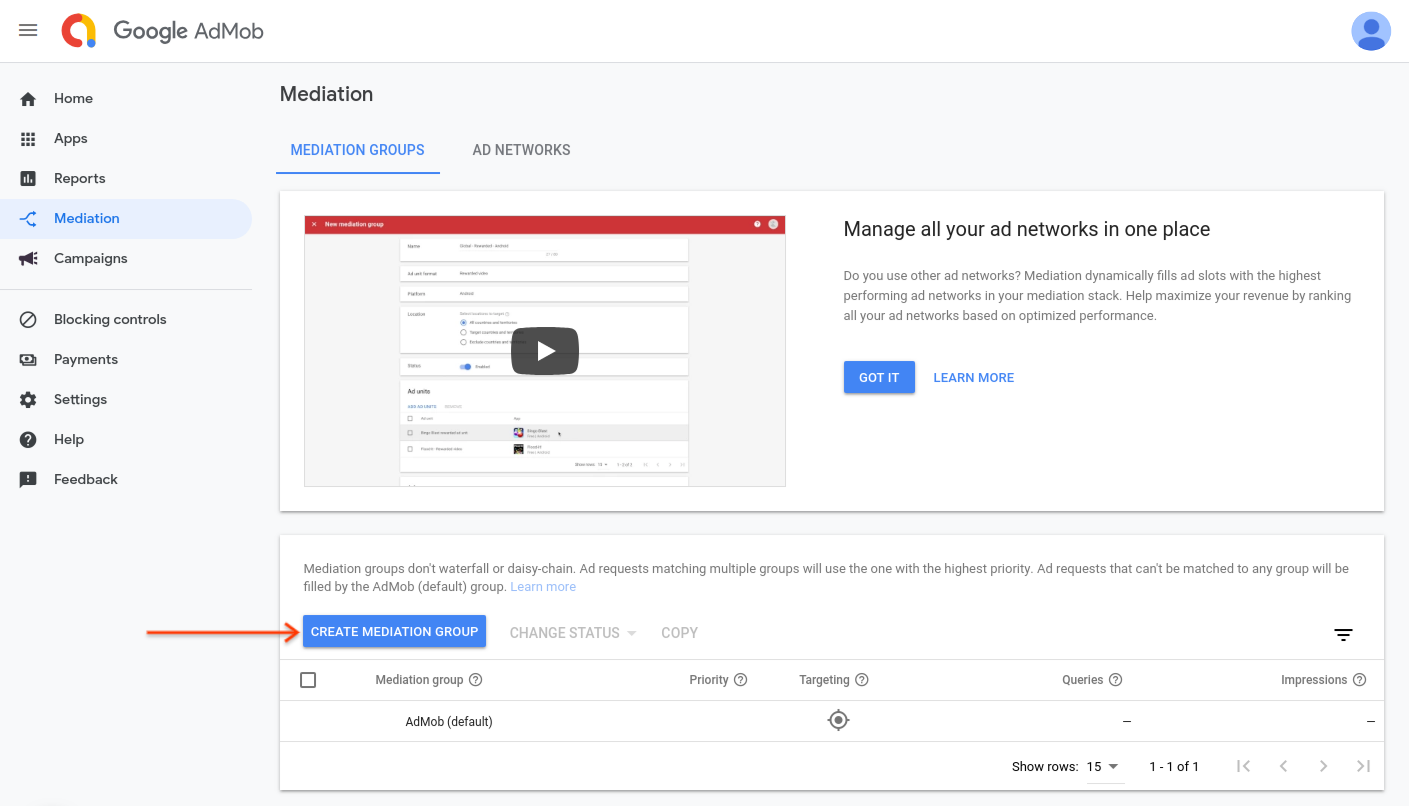
Enter your ad format and platform, then click Continue.
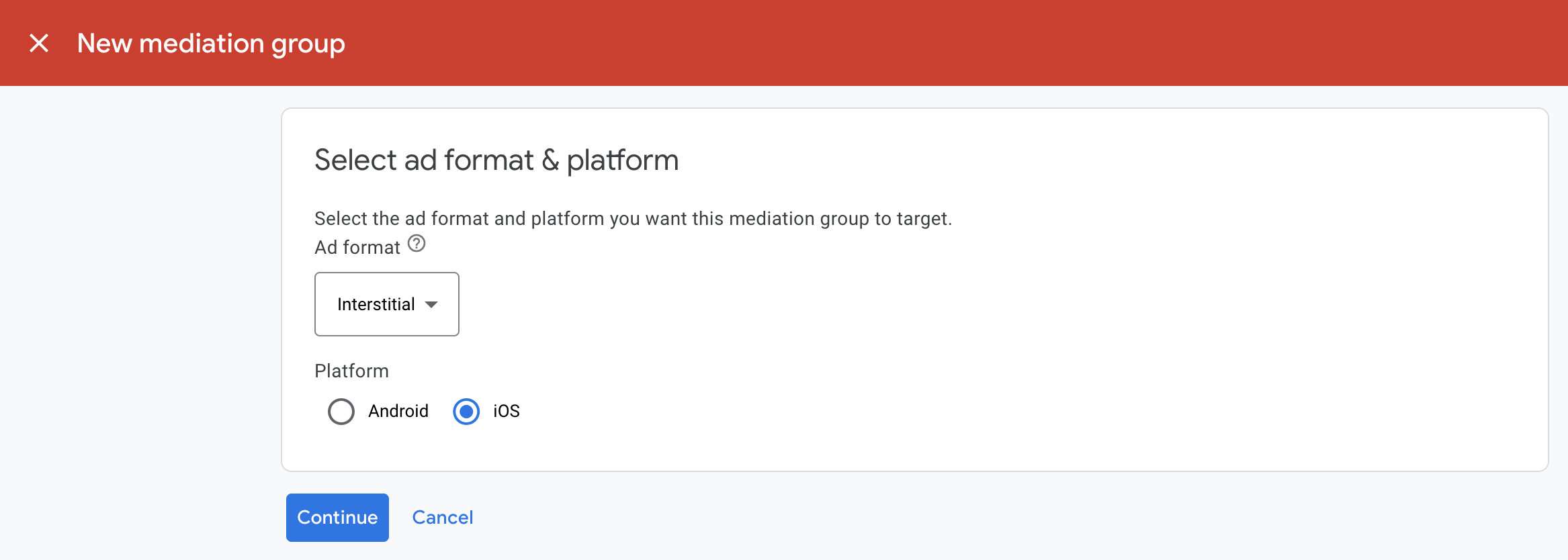
Give your mediation group a name, and select locations to target. Next, set the mediation group status to Enabled, and then click Add Ad Units.
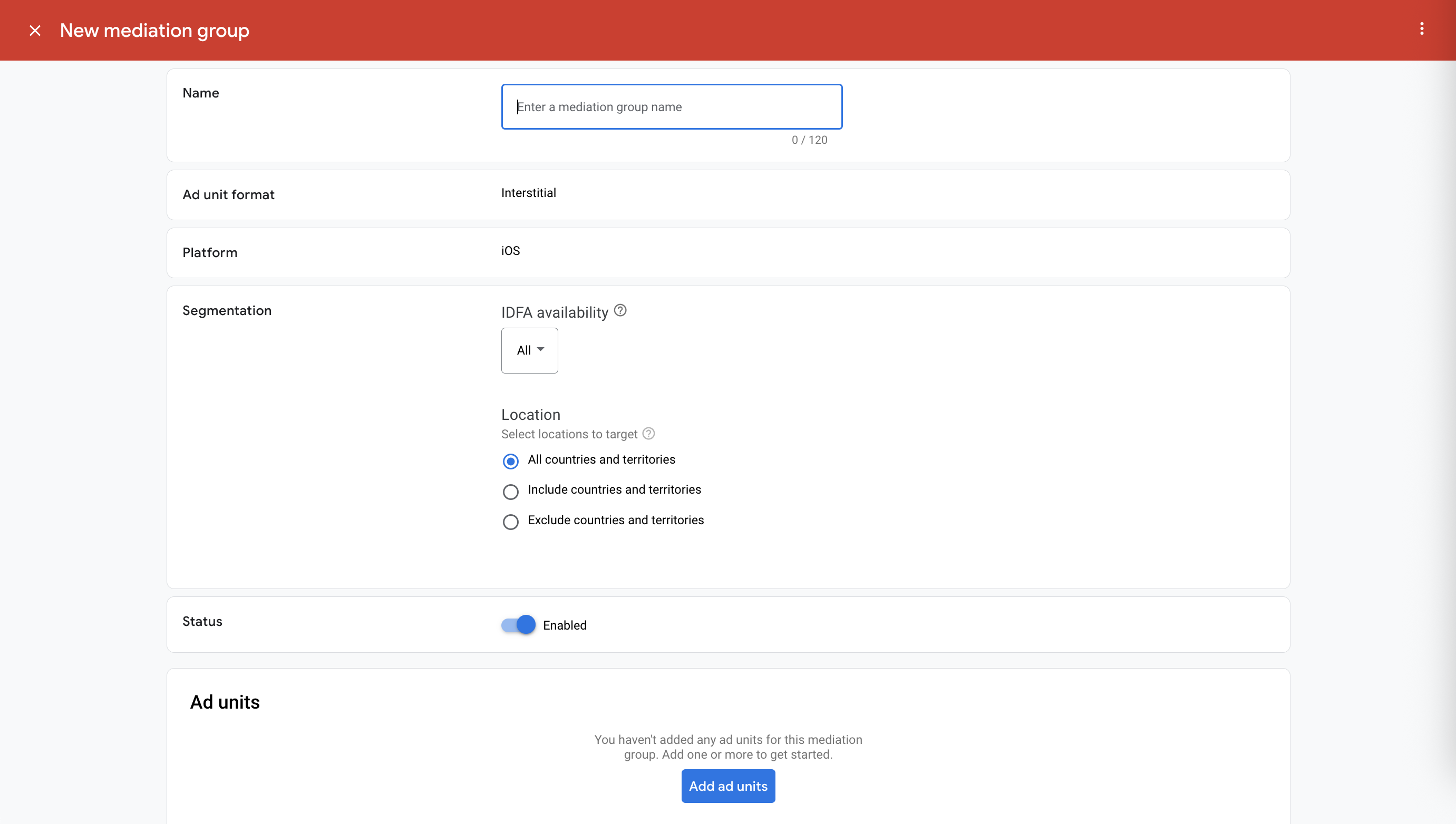
Associate this mediation group with one or more of your existing AdMob ad units. Then click Done.
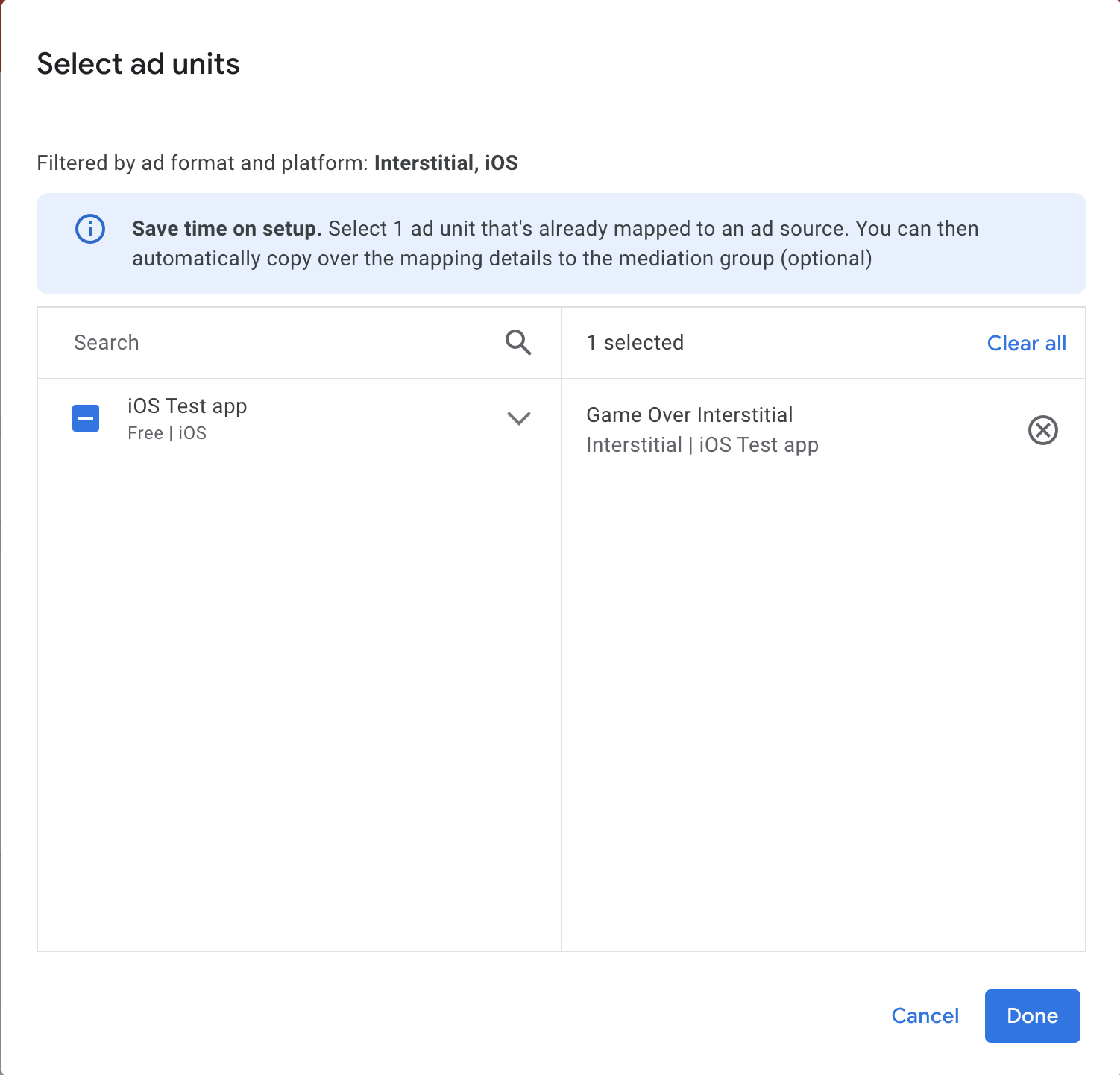
You should now see the ad units card populated with the ad units you selected:

Add PubMatic OpenWrap SDK as an ad source
Under the Bidding card in the Ad Sources section, click Add ad source. Then select PubMatic OpenWrap SDK.
Click Acknowledge & agree and then click Save.
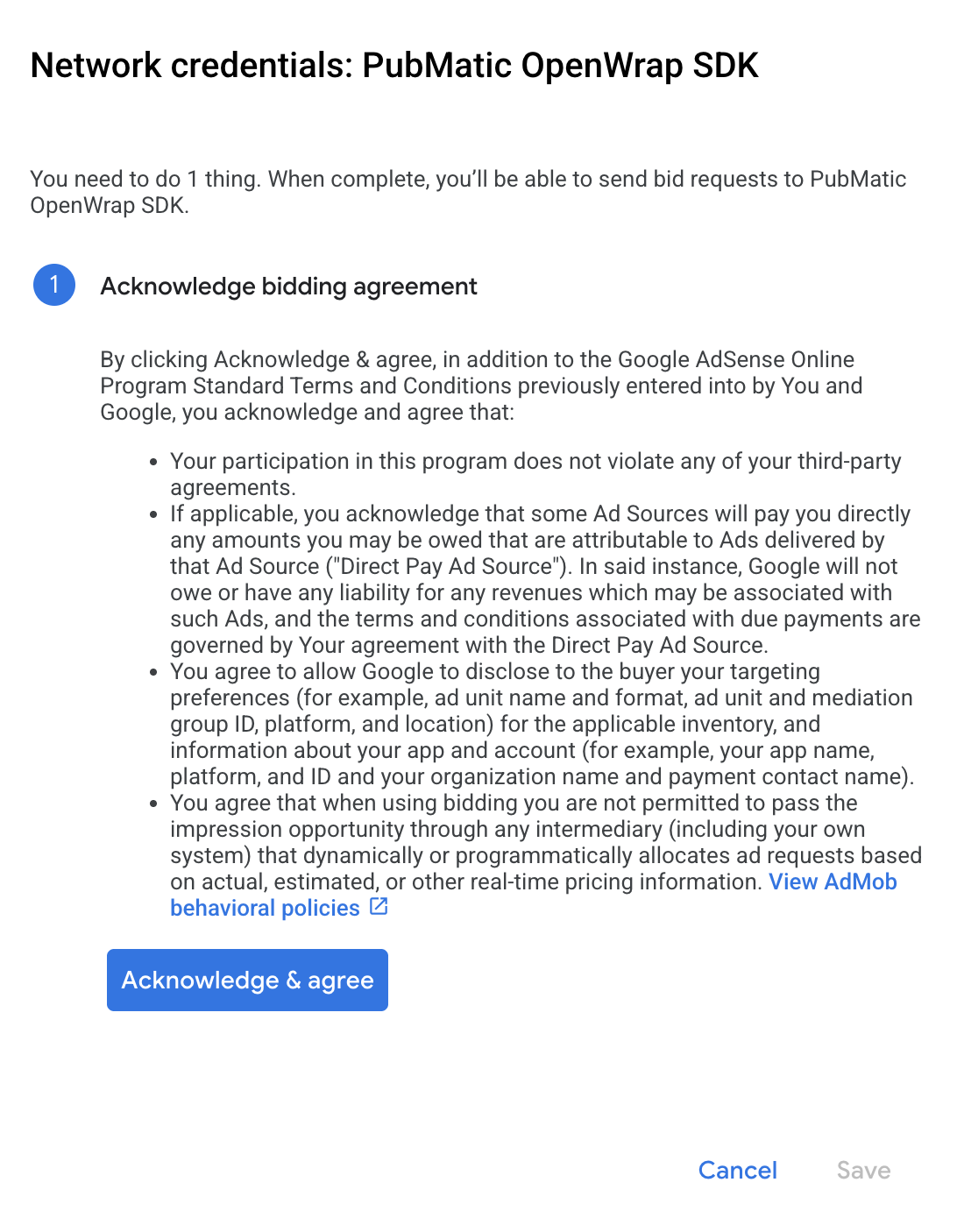
If you already have a mapping for PubMatic OpenWrap SDK, you can select it. Otherwise, click Add mapping.

Next, enter the OpenWrap Ad Unit ID obtained in the previous section. Then click Done.

Add PubMatic to GDPR and US state regulations ad partners list
Follow the steps in European regulations settings and US state regulations settings to add PubMatic to the European and US state regulations ad partners list in the AdMob UI.
Step 3: Import the PubMatic OpenWrap SDK and adapter
Use Swift Package Manager
Before you continue, you must have the minimum supported adapter version 4.10.0.0.
To add a package dependency to your project, follow these steps:
In Xcode, navigate to File > Add Package Dependencies....
In the prompt that appears, search the following package URL:
https://github.com/googleads/googleads-mobile-ios-mediation-pubmatic.gitIn Dependency Rule, select Branch.
In the text field, enter
main.
Use CocoaPods
Add the following line to your project's Podfile:
pod 'GoogleMobileAdsMediationPubMatic'From the command line run:
pod install --repo-update
Manual integration
Download the latest version of the PubMatic OpenWrap SDK for iOS and link all the
.xcframeworkfiles and bundles in your project.Download the latest version of the PubMatic adapter from the download link in the Changelog and link
PubMaticAdapter.xcframeworkin your project.
Step 4: Implement privacy settings on PubMatic
To comply with Google EU User Consent Policy, you must make certain disclosures to your users in the European Economic Area (EEA), the UK, and Switzerland, and obtain their consent for the use of cookies or other local storage where legally required, and for the collection, sharing, and use of personal data for ads personalization. This policy reflects the requirements of the EU ePrivacy Directive and the General Data Protection Regulation (GDPR). You are responsible for verifying consent is propagated to each ad source in your mediation chain.
PubMatic automatically reads GDPR consent set by consent management platforms that support Google's Additional Consent specification, including the UMP SDK. For more information, see Pass GDPR and GDPR consent.
US states privacy laws
US states privacy laws require giving users the right to opt out of the "sale" of their "personal information" (as the law defines those terms), with the opt-out offered through a prominent "Do Not Sell My Personal Information" link on the "selling" party's homepage. The US states privacy laws compliance guide offers the ability to enable restricted data processing for Google ad serving, but Google is unable to apply this setting to each ad network in your mediation chain. Therefore, you must identify each ad network in your mediation chain that may participate in the sale of personal information and follow guidance from each of those networks to ensure compliance.
PubMatic automatically reads GPP consent set by consent management platforms that support Google's Additional Consent specification, including the UMP SDK. For more information, see Pass GPP consent.
Step 5: Add required code
Implement SKAdNetwork
Follow PubMatic's documentation
to add the SKAdNetwork identifiers to your project's Info.plist file.
Step 6: Test your implementation
Enable test ads
Make sure you register your test device for AdMob.
Verify test ads
To verify that you are receiving test ads from PubMatic OpenWrap SDK, enable single ad source testing in ad inspector using the PubMatic (Bidding) ad source(s).
Optional Steps
Native ads
Ad rendering
The PubMatic adapter returns its native ads as
GADNativeAd
objects. It populates the following
fields
for a
GADNativeAd.
| Field | Assets always included by PubMatic adapter |
|---|---|
| Headline | |
| Image | |
| Body | |
| Icon | |
| Call to action | |
| Star rating | |
| Store | |
| Price | |
| Advertiser |
Error codes
If the adapter fails to receive an ad from PubMatic, you can check the
underlying error from the ad response using
GADResponseInfo.adNetworkInfoArray
under the following classes:
GADMediationAdapterPubMatic
Here are the codes and accompanying messages thrown by the PubMatic adapter when an ad fails to load:
| Error code | Domain | Reason |
|---|---|---|
| 101 | com.google.ads.mediation.pubmatic | Server configuration missing a required publisher ID. |
| 102 | com.google.ads.mediation.pubmatic | The bidding signal collection request failed because multiple formats, no format, or an unsupported format was specified in the request parameters. |
| 103 | com.google.ads.mediation.pubmatic | Invalid ad configuration for loading an ad. |
| 104 | com.google.ads.mediation.pubmatic | Failed to present an interstitial ad because the ad was not ready. |
| 105 | com.google.ads.mediation.pubmatic | Failed to present an rewarded ad because the ad was not ready. |
| 106 | com.google.ads.mediation.pubmatic | Failed to load one of the native ad image sources. |
| 1001-5002 | Sent by PubMatic SDK | PubMatic SDK returned an error. See PubMatic's documentation for more details. |
PubMatic iOS Mediation Adapter Changelog
Version 4.12.0.0
- Verified compatibility with PubMatic OpenWrap SDK version 4.12.0.
- Updated the Google Mobile Ads SDK dependency to version 13.0.0.
Built and tested with:
- Google Mobile Ads SDK version 13.0.0.
- PubMatic OpenWrap SDK version 4.12.0.
Version 4.11.0.2
- Updated the CocoaPods minimum iOS version to
13.0.
Built and tested with:
- Google Mobile Ads SDK version 13.0.0.
- PubMatic OpenWrap SDK version 4.11.0.
Version 4.11.0.1
- Added support for forwarding the
tagForChildDirectedTreatmentandtagForUnderAgeOfConsentGoogle Mobile Ads SDK parameters to the PubMatic OpenWrap SDK.
Built and tested with:
- Google Mobile Ads SDK version 12.14.0.
- PubMatic OpenWrap SDK version 4.11.0.
Version 4.11.0.0
- Verified compatibility with PubMatic OpenWrap SDK version 4.11.0.
Built and tested with:
- Google Mobile Ads SDK version 12.14.0.
- PubMatic OpenWrap SDK version 4.11.0.
Version 4.10.0.0
- Verified compatibility with PubMatic OpenWrap SDK version 4.10.0.
Built and tested with:
- Google Mobile Ads SDK version 12.12.0.
- PubMatic OpenWrap SDK version 4.10.0.
Version 4.9.0.0
- Added waterfall support for banner, interstitial, rewarded and native ad formats.
- Fixed a bug where native ad delegates were not correctly set.
- Add a test mode property in the
GADMediationAdapterPubMaticExtrasclass. - Verified compatibility with PubMatic OpenWrap SDK version 4.9.0.
Built and tested with:
- Google Mobile Ads SDK version 12.12.0.
- PubMatic OpenWrap SDK version 4.9.0.
Version 4.8.1.0
- Verified compatibility with PubMatic OpenWrap SDK version 4.8.1.
Built and tested with:
- Google Mobile Ads SDK version 12.9.0.
- PubMatic OpenWrap SDK version 4.8.1.
Version 4.8.0.0
- Verified compatibility with PubMatic OpenWrap SDK version 4.8.0.
Built and tested with:
- Google Mobile Ads SDK version 12.8.0.
- PubMatic OpenWrap SDK version 4.8.0.
Version 4.7.0.0
- Initial release.
- Supports bidding for banner, interstitial, rewarded and native ad formats.
- Verified compatibility with PubMatic OpenWrap SDK version 4.7.0.
Built and tested with:
- Google Mobile Ads SDK version 12.6.0.
- PubMatic OpenWrap SDK version 4.7.0.
